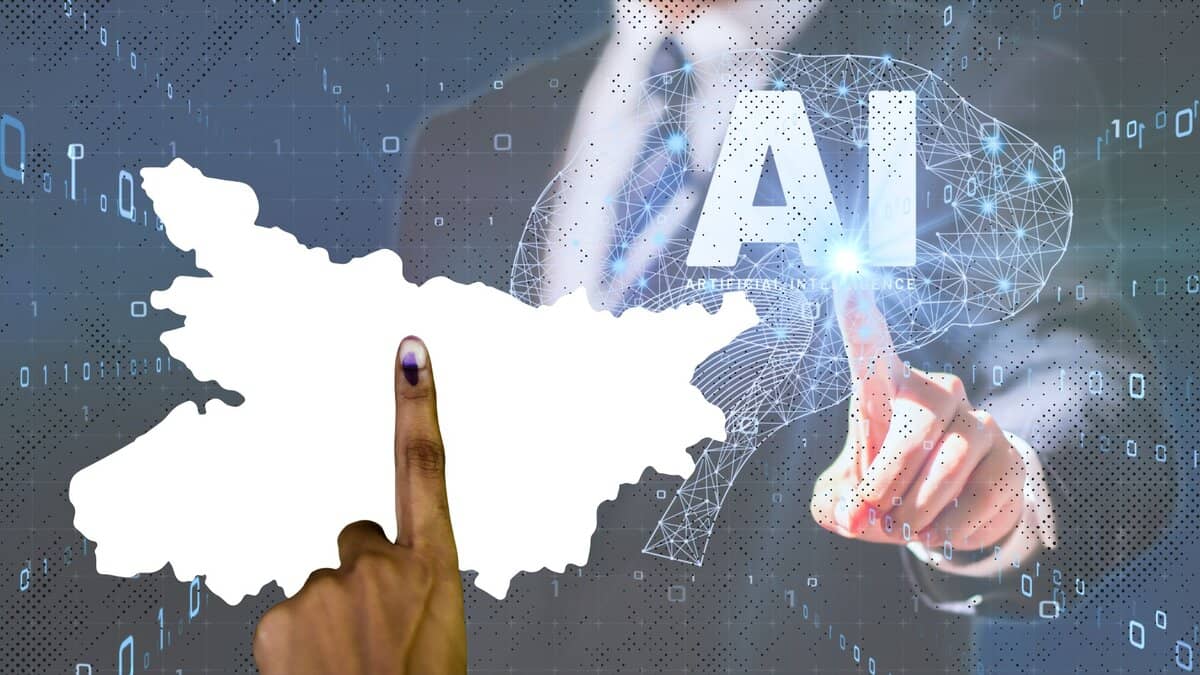
Last year was a high-profile election year with 60 countries going to the polls. This included India.
Artificial Intelligence played a prominent role in predicting voter turnout, identifying potential swing voters, voter preferences, and optimising campaign schedules for maximum impact. It was hailed as the AI election year.
As Security Guru Schneier rightly pointed out, democracy is not just about the outcome, but the human process behind it. Supporters claim AI is here to enhance that process, not replace it.
AI and Bihar polls
AI will come into play again in India at the end of the year during the Bihar Assembly polls. Uttar Pradesh and Bihar are two critical states, and political parties are closely watching the scene to see who gets the jackpot. Political parties, both national and regional, are preparing for the upcoming election. The ruling coalition, Janata Dal (United) [JD (U)], seeks to maintain its position, while the Mahaghatbandhan, under the leadership of Tejashwi Yadav, is striving to gain control of the government.
Artificial intelligence is gradually influencing the electoral landscape in India and around the world, amid debates about whether it is a curse or a boon. Voters are being targeted using AI in various regions. Notably, many unsuspecting voters are willing to believe the information or misinformation they encounter.
The electoral activity worldwide has reached new heights, coinciding with rapid advancements in AI. This sparked serious discussions about how AI might change political campaigns, voter engagement, and electoral management. Political parties are using technology in new ways. For example, AI was used to analyse voter sentiment, predict voter turnout, and even create personalised campaign messages.
2024 polls were AI elections
Prime Minister Narendra Modi uses the AI platform NaMo to talk to voters and answer their questions in real time. He also uses holograms to speak at several rallies in different places at the same time. This technology enables Modi to reach more voters without attending in person.
The upcoming Bihar elections will utilize AI, which offers new ways to improve political campaigns, such as targeted advertising, analyzing voter opinions, and predicting voter turnout. These tools can make campaigns more efficient and effective. However, they also bring challenges.
AI helps voters find helpful information about candidates, but it also spreads false information. Many voters struggle to verify the authenticity of the messages and calls they receive. In the 2024 elections in India, political parties used AI to create fake audio and video endorsements, satirical content, and false propaganda that looked like it came from essential figures.
Inclusive voter participation
AI can significantly improve voter engagement, even though it has some challenges. During this time, only about 2% of the content created came from AI. This small amount focused mainly on outreach and getting voters involved. This shows a positive side of AI in elections and suggests it can help connect voters to the political process.
AI chatbots are an excellent way for candidates to connect with voters personally, in addition to using social media and messaging platforms. Candidates can answer voters’ questions and address their concerns directly. They can also note these issues to improve their campaigns. Political parties can send personalised messages based on voters’ backgrounds, voting history, and other relevant factors.
The 2024 polls served as a testing ground for the future. The results were not as shocking as many predicted. But they showed significant risks as the information continues to be distorted.
The 2024 Global Risks Report highlights potential hazards such as AI-generated misinformation, voter manipulation, and the erosion of trust in the poll process.
The AI is used by the Election Commission to enhance poll management, streamline the election process, and improve poll management.
Regulations required for AI
However, with all the pros and cons, there is a need for proper regulation of AI in polls and other areas. As of now, it is not much. Not only India but also other countries held a conference in the U.K. some time ago; India also attended the conference.
Recently, presenting a case for proper regulations in AI, the Ministry of Electronics and Information Technology reported to the Delhi High Court about the dangers of AI use and called for transparent rules and disclosure of the AI content.
AI can be helpful during elections in several ways. For example, FiscalNote is a tool that aids in policy-making. It can also gather information from voters about the policies they prefer. Similarly, iSide With allows candidates to learn about themselves and see if they match voters’ views. Voters can take quizzes to find out which candidates align with their beliefs.
Cheaper to manage polls
But the plus points are also helpful in election management. It is much cheaper to manage polls. It can gather information from the voters about the policies they prefer. AI can help in policy-making.
Some believe AI will eventually take over the world. As it stands, with companies like Google and Facebook, we have lost our privacy, and it’s unimaginable what might happen if AI controls everything.


